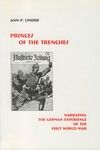This book is a long overdue study of German First World War literature, providing an alternative view for English speakers. In addition to the major themes of purposeless suffering, disillusionment, and irreparable loss, Ann Linder's systematic reading of German war narratives yields a different set of themes and a different manner of expression. She argues that most present a conservative vision, one rooted in the strong comradeship of Front soldiers and in their conviction that the experience, and indeed the war itself, however terrible, had personal and historical significance for the participants and their nation. This vision, originating in the romantic nationalism of nineteenth-century German thought, profoundly influenced German attitudes in the last years of the Weimar republic.
| LoC Classification |
PT772 .L53 1996 |
| LoC Control Number |
96014349 |
| Dewey |
833.91209358 |
| Nationality |
German |
| Dust Jacket |
dj |
| Cover Price |
$35.00 |
| No. of Pages |
216 |
| Height x Width |
9.3
x
6.2
inch |
|
|
|
|
This book is a long overdue study of German First World War literature, providing an alternative view for English speakers. In addition to the major themes of purposeless suffering, disillusionment, and irreparable loss, Ann Linder's systematic reading of German war narratives yields a different set of themes and a different manner of expression. She argues that most present a conservative vision, one rooted in the strong comradeship of Front soldiers and in their conviction that the experience, and indeed the war itself, however terrible, had personal and historical significance for the participants and their nation. This vision, originating in the romantic nationalism of nineteenth-century German thought, profoundly influenced German attitudes in the last years of the Weimar republic.
